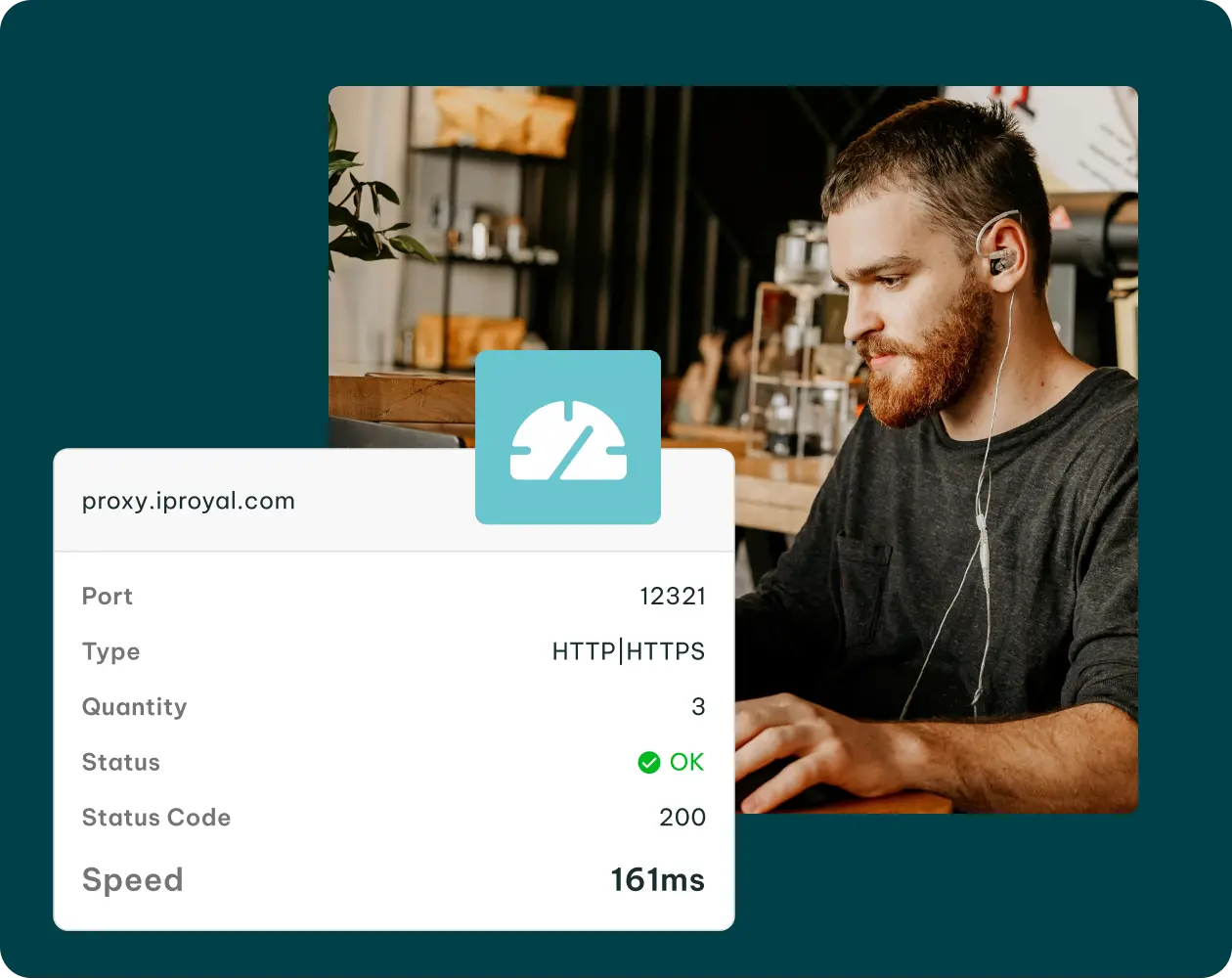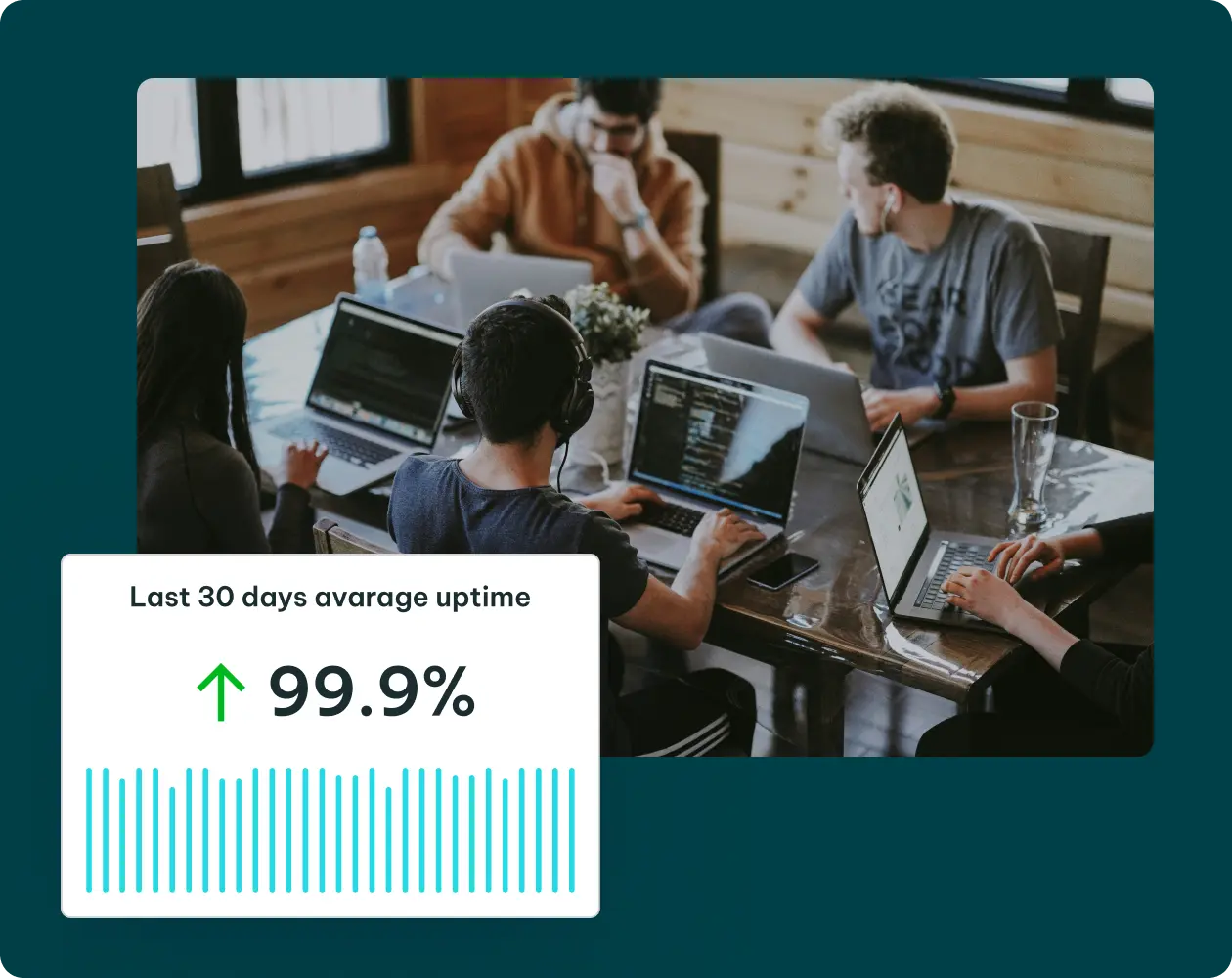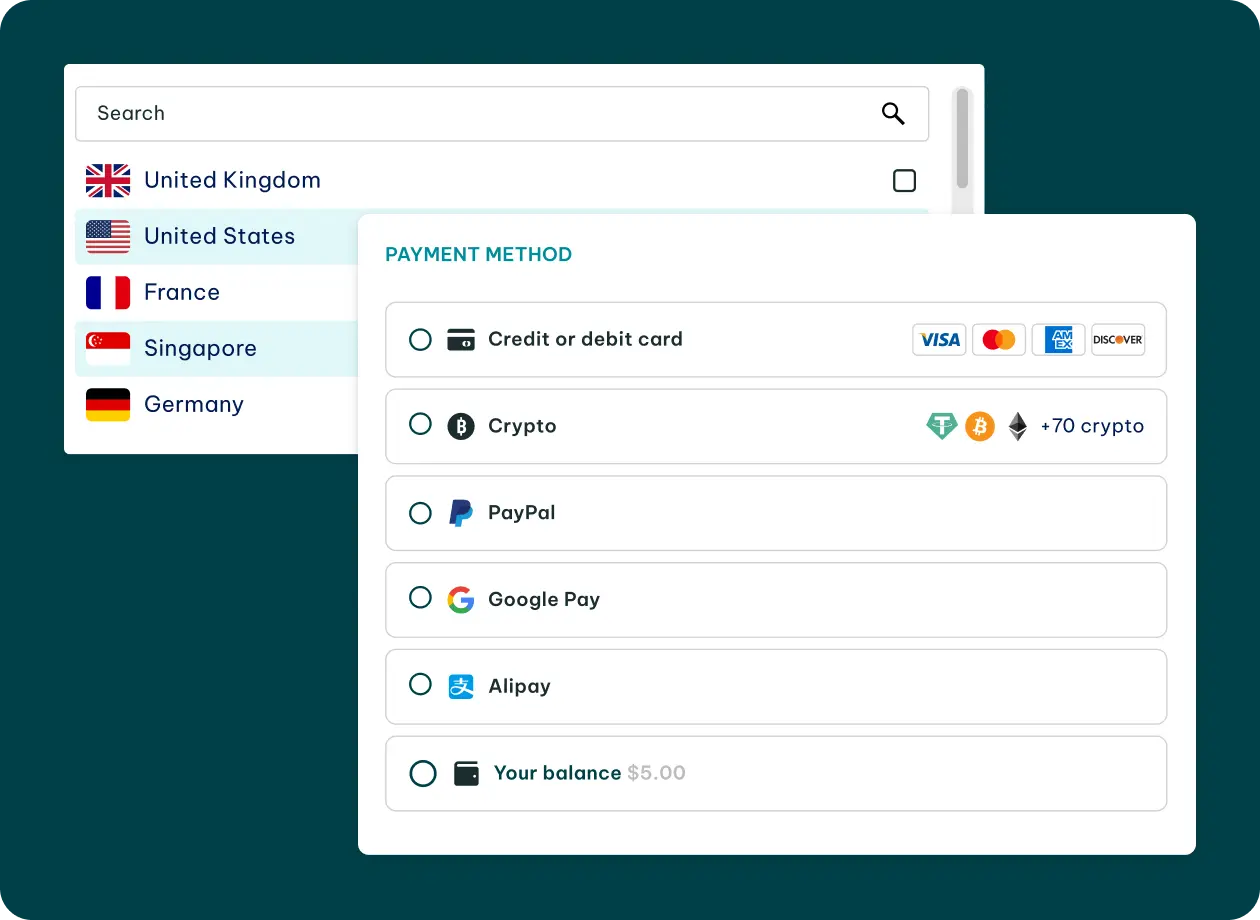Datacenter Proxies with Unlimited Bandwidth
- 99.9% uptime
- Market-leading speeds
- HTTP(S) and SOCKS5 protocols
- State and city-level targeting
- Dedicated IPs in 56+ countries
- Easy integration & API support
- UDP and TCP connections
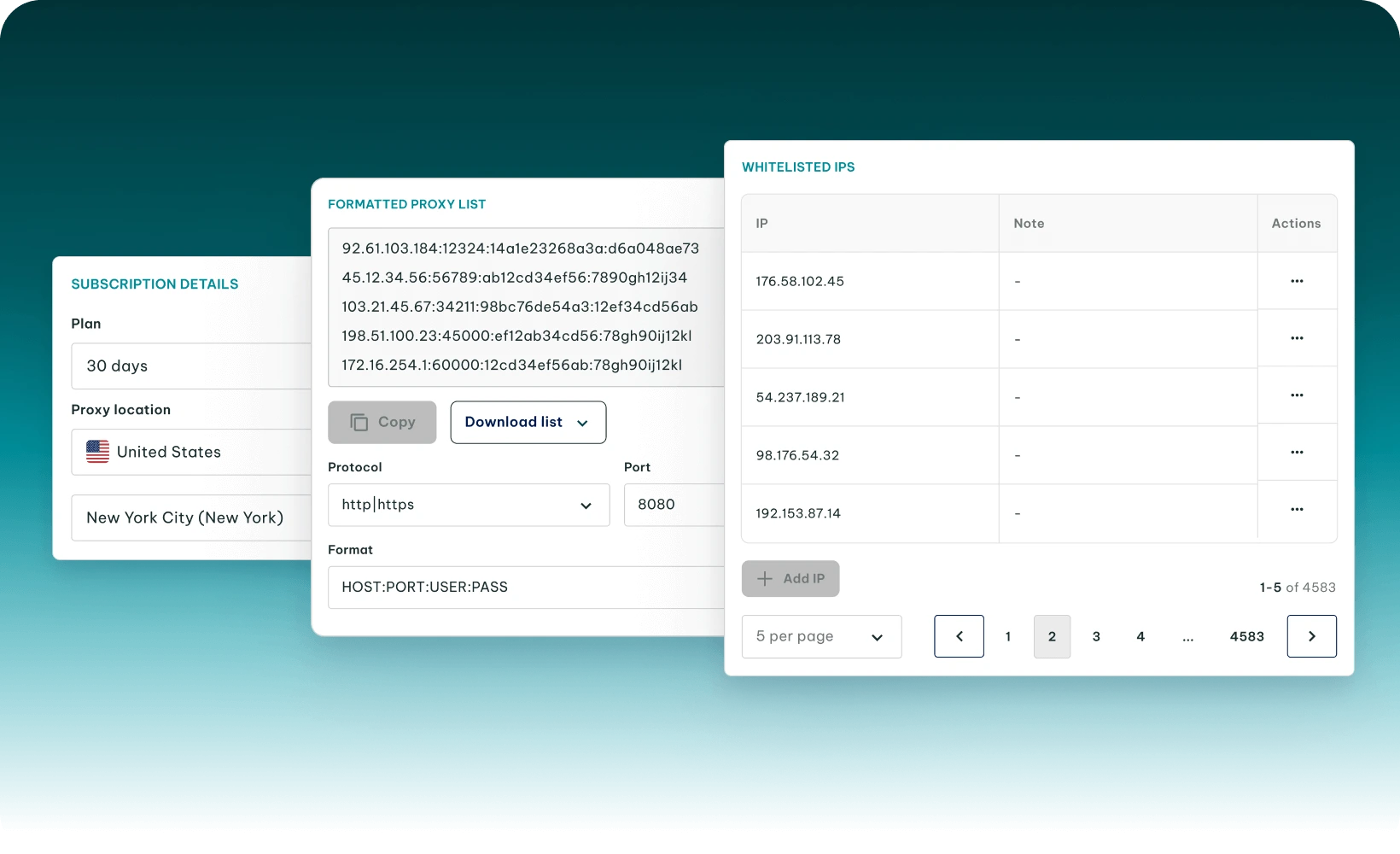
Datacenter Proxy Locations
- India IN 1,750,192 IPs
- United States US 1,450,886 IPs
- Indonesia ID 1,173,102 IPs
- Brazil BR 908,824 IPs
- Spain ES 781,766 IPs
- Philippines PH 545,729 IPs
- Mexico MX 492,345 IPs
- Japan JP 487,067 IPs
- Vietnam VN 460,712 IPs
- Egypt EG 458,732 IPs
- Germany DE 439,883 IPs
- Turkey TR 428,506 IPs
- Thailand TH 423,856 IPs
- United Kingdom GB 421,770 IPs
- France FR 418,633 IPs
- South Africa ZA 400,987 IPs
- Saudi Arabia SA 394,094 IPs
- Italy IT 393,154 IPs
- Colombia CO 389,546 IPs
- Poland PL 374,871 IPs
- Canada CA 373,796 IPs
- Malaysia MY 372,002 IPs
- Peru PE 369,928 IPs
- Morocco MA 369,864 IPs
- Ukraine UA 366,796 IPs
- Argentina AR 362,389 IPs
- Mozambique MZ 362,117 IPs
- Australia AU 361,356 IPs
- South Korea KR 358,185 IPs
- Venezuela VE 358,168 IPs
- Zimbabwe ZW 328,491 IPs
- Chile CL 317,079 IPs
- Romania (15% OFF) RO 315,800 IPs
- Belgium (15% OFF) BE 310,475 IPs
- Greece GR 299,136 IPs
- Israel IL 292,973 IPs
- Netherlands NL 282,025 IPs
- Sweden SE 246,814 IPs
- Hungary HU 238,522 IPs
- Czech Republic (15% OFF) CZ 234,744 IPs
- Portugal (15% OFF) PT 233,852 IPs
- Switzerland (15% OFF) CH 233,758 IPs
- Austria (15% OFF) AT 229,138 IPs
- Hong Kong HK 225,496 IPs
- Bulgaria (15% OFF) BG 222,963 IPs
- Denmark (15% OFF) DK 213,707 IPs
- Serbia RS 213,286 IPs
- Singapore SG 211,973 IPs
- Norway (15% OFF) NO 211,917 IPs
- Finland (15% OFF) FI 211,335 IPs
- Ireland IE 205,109 IPs
- Slovakia (15% OFF) SK 204,102 IPs
- New Zealand NZ 188,253 IPs
- Croatia HR 186,422 IPs
- Lithuania (15% OFF) LT 171,151 IPs
- Botswana BW 153,004 IPs
- Namibia NA 152,719 IPs
- Albania AL 131,639 IPs
- Qatar QA 131,121 IPs
- Slovenia (15% OFF) SI 128,694 IPs
- Estonia (15% OFF) EE 58,157 IPs
- Latvia LV 55,097 IPs
- Luxembourg LU 50,923 IPs
IPRoyal Datacenter Proxy Advantages
Dedicated datacenter proxies (also known as DC proxies) are incredible at three things—speed, reliability, and price.
Buy Datacenter Proxy Servers
30
Days
-
Unlimited Traffic
-
99.9% uptime
-
Not Shared
-
40+ Locations
-
SOCKS5 Supported
Best value
60
Days
-
Unlimited Traffic
-
99.9% Uptime
-
Not Shared
-
40+ Locations
-
SOCKS5 Supported
Best results
90
Days
-
Unlimited Traffic
-
99.9% Uptime
-
Not Shared
-
40+ Locations
-
SOCKS5 Supported
Datacenter Proxy Use Cases
What Is a Datacenter Proxy?
Datacenter Servers vs Residential IPs
Datacenter proxies, like any other type, act as an intermediary between your computer and a destination server. Datacenter proxies are acquired from other businesses, which are running large clusters of servers. These servers are used to create many datacenter IP addresses at once.
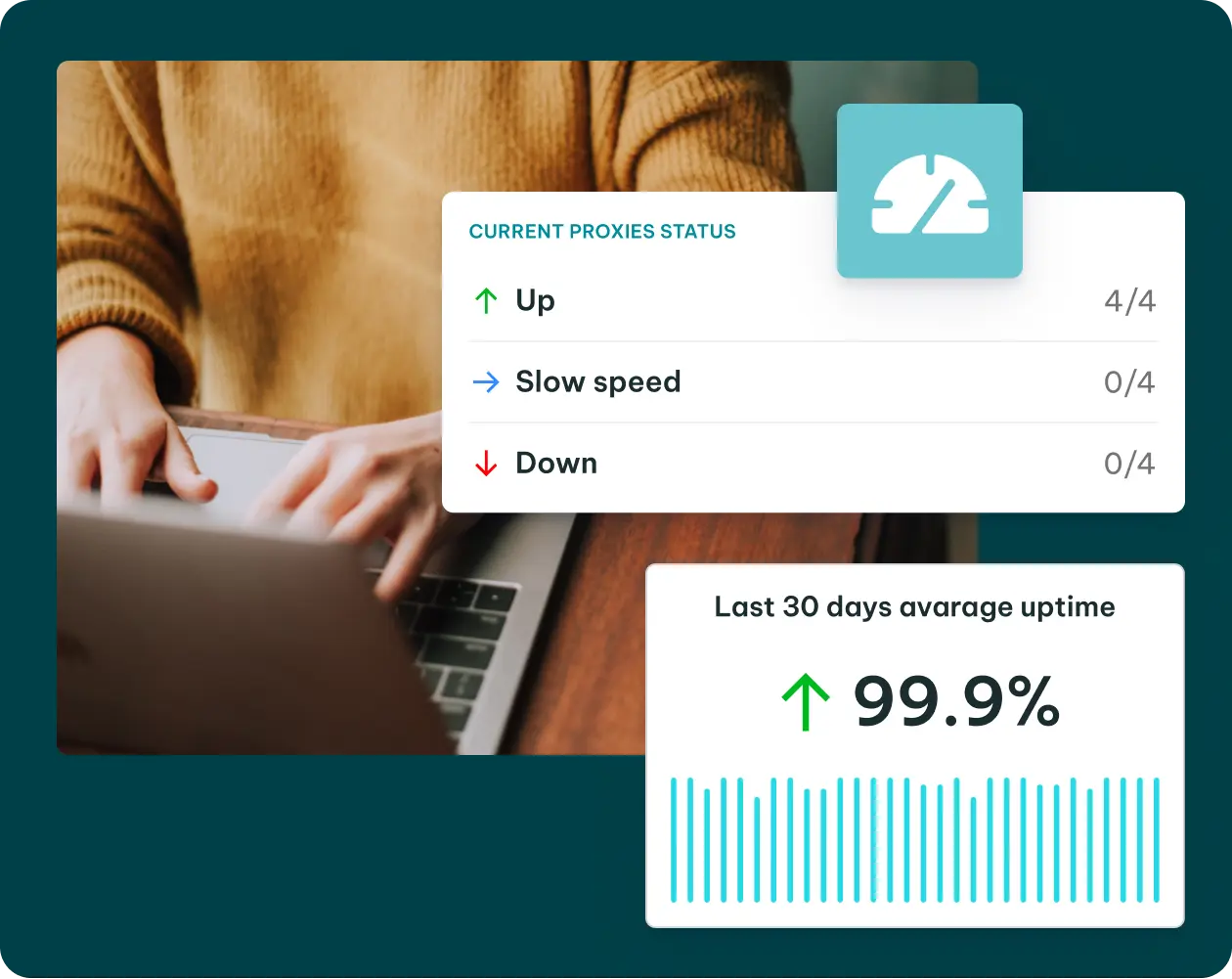
Datacenter Proxy Benefits
While datacenter proxies are easier to detect than residential proxies, they are significantly faster and more stable. Data centers will usually have a better internet connection than any household while also being less prone to being turned off when compared to a regular internet user’s device. You can also choose proxies from a specific state or city, and stick to the same datacenter IP for longer than a residential proxy.
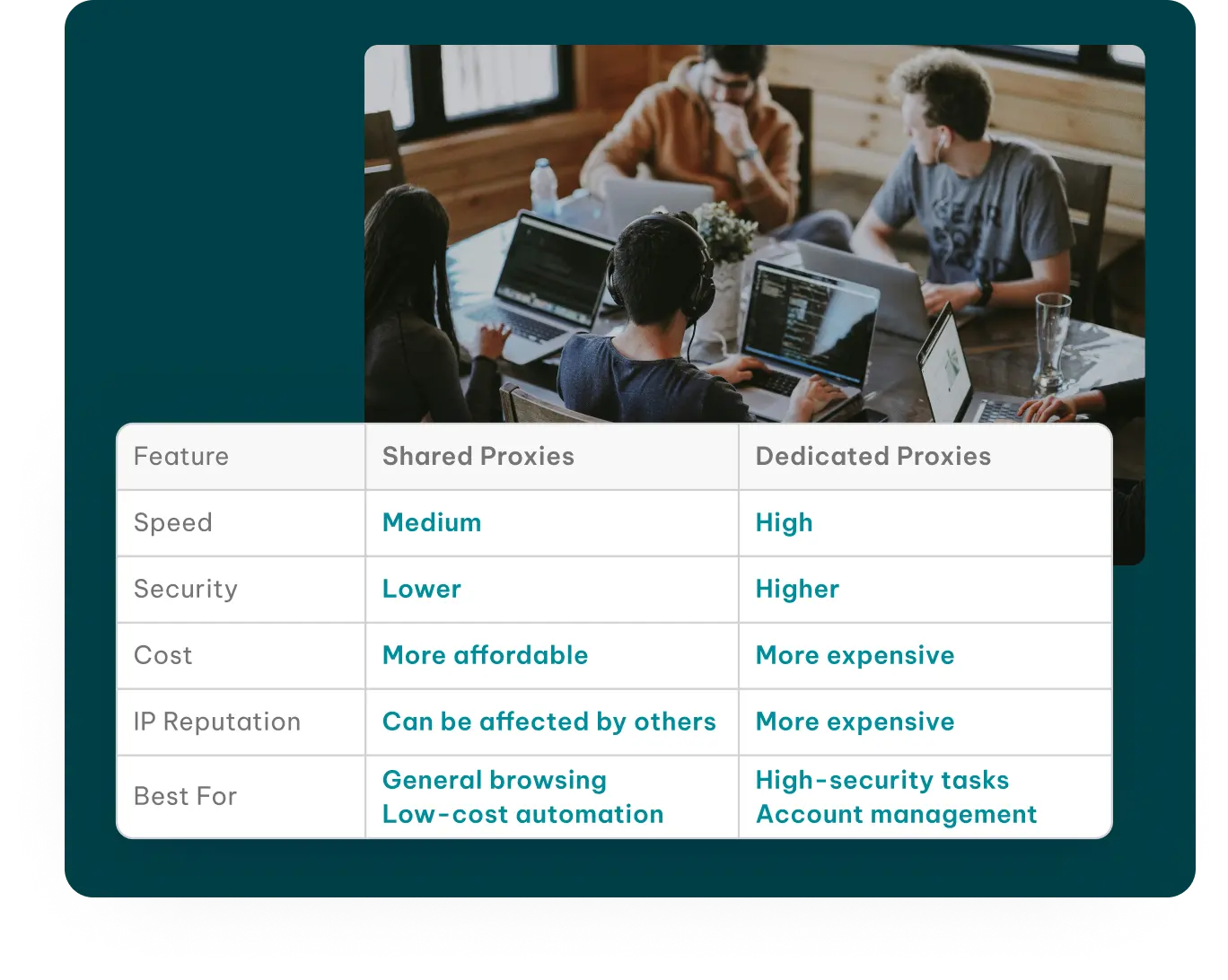
Dedicated vs Shared Datacenter Proxies
Additionally, some datacenter proxy providers sell both dedicated and shared datacenter proxies. Shared datacenter proxies allow many different users to use the same IP address. We believe that dedicated datacenter IPs are best as they allow you to take full advantage of the speed and reliability that unlimited datacenter proxies provide.
REVIEWS
Trusted Datacenter Proxies
Datacenter proxies are used by individuals and global businesses alike. Our goal is to provide infrastructure that would match everyone’s needs, no matter how stringent they may be.
IPRoyal has a far more extensive collection of features than your standard web proxy, including over 195 countries of coverage, more than thirty two million IP addresses to select from at the highest-tier plan, and additional options like timed auto-rotation of your IP and instant IP changes.
IPRoyal is dedicated to transparency and to providing best-in-class service to their customers through a variety of affordable solutions and plans that come with round-the-clock support.
With a selection of different subscription options, some of the most affordable prices we’ve seen, and a responsive support team, IPRoyal rises to the top as a leading proxy service provider.
FAQ
Are datacenter proxies legal?
Yes, all datacenter proxies are acquired through a contract between two businesses. Using them is also legal as long as the activity itself is legal.
What are datacenter proxies used for?
Datacenter proxies are widely used wherever speed, reliability, and low costs are important. While their geo-targeting features are weaker when compared to residential proxies, if the former is not important, datacenter proxies can be used for web scraping, ad verification, brand protection, and much more.
What are dedicated datacenter proxies?
A dedicated datacenter proxy differs from a shared one only by virtue of how many users can use the same IP address at once. Dedicated proxies are granted to a single user while shared may have many users at once. They are also sometimes called private datacenter proxies as you can use the same IP address for a long time without other users making use of it.
What are the best types of proxies?
Usually, it’s best to understand your use case and its requirements to find the best proxy. If you don’t need precise geo-targeting or residential IPs, datacenter proxies will be a great match. If residential IPs are required, but speed is not as important, residential proxies work great. If all features are required, ISP proxies will be your best bet.
Should I use free datacenter proxies?
Free datacenter proxies can be tempting, however, most of them will be shared, at the very least. Performance will definitely take a hit and you’ll likely be missing many vital features such as the selection of datacenter proxy network locations or static IP addresses. That’s the best case scenario. With free datacenter proxies you’ll also likely leak data to the provider who might decide to sell that information to third parties. So, you’ll be paying with your data instead of money. So, the best budget datacenter proxies are those that you pay for directly as they’ll give you better performance, reliability, and security.
How do I get started with proxies?
Setting up our unlimited datacenter proxies is extremely simple and quick. We’ve created a few quick resources to help you get started such as our step-by-step datacenter proxy quick-start guide.
If you’re still having troubles when setting up your datacenter proxies, don’t hesitate to contact our support by using the “Chat” button at the bottom right of the screen!
What is the difference between ISP and datacenter proxies?
ISP proxies are stored in data centers, but have an IP address that’s registered to an Internet Service Provider. They combine the benefits of residential and datacenter proxies into one package, providing speed, reliability, and low detection rates. Additionally, they’ll also usually be static datacenter proxies, allowing you to take advantage of all these features according to your own needs.
Are datacenter proxies detectable?
Detection capabilities will depend upon the website, but, in general, datacenter proxies can be detected more easily than residential IPs. Datacenter proxy servers have IPs that originated from business-owned machines, which makes them seem a little more suspicious. As such, some websites may choose to ban datacenter proxy IPs earlier than those of residential proxies.
Are proxies safer than a VPN?
Yes and no. A proxy IP is usually less well known to large websites, so they often won’t know you’re using one to connect to them while some household name VPNs are carefully monitored, allowing websites to know you’re using one. On the other hand, VPNs do come with numerous additional security features which may be beneficial.
What is the difference between a VPN and a proxy server?
Both technologies have an almost identical underlying principle – they reroute your traffic through a remote server. You can, however, get a much larger proxy server pool than any VPN will provide, allowing you to freely switch between IPs without ever running out, but VPNs will often be easier to use for regular users and have some additional security features.































































